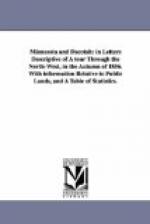I will also add another remark which he makes, inasmuch as the character of the country in this latitude, as far as the Pacific shore, must have great influence on this locality; and it is this: " Probably four thousand square miles of tillable land is to be found immediately on the eastern slopes of (the Rocky Mountains); and at the bottoms of the different streams, retaining their fertility for some distance after leaving the mountains, will considerably increase this amount.” Mr. John Lambert, the topographer of the exploration, divides the country between the Mississippi and Columbia rivers, into three grand divisions. The first includes the vast prairies between the Mississippi and the base of the Rocky Mountains. The second is the mountain division, embracing about five degrees of longitude. The third division comprises the immense plains of the Columbia.
Of the first division— from here to the foot of the Rocky Mountains— let me quote what Mr. Lambert in his official report calls a “passing glance.” “Undulating and level prairies, skirted with woods of various growth, and clothed everywhere with a rich verdure; frequent and rapid streams, with innumerable small but limpid lakes, frequented by multitudes of waterfowl, most conspicuous among which appears the stately swan; these, in ever-recurring succession, make up the panorama of this extensive district, which may be said to be everywhere fertile, beautiful, and inviting. The most remarkable features of this region are the intervals of level prairie, especially that near the bend of Red River, where the horizon is as unbroken as that of a calm sea. Nor are other points of resemblance wanting— the long grass, which in such places is unusually rank, bending gracefully to the passing breeze as it sweeps along the plain, gives the idea of waves (as indeed they are); and the solitary horseman on the horizon is so indistinctly seen as to complete the picture by the suggestion of a sail, raising the first feeling of novelty to a character of wonder and delight. The following outlines of the rolling prairies are broken only by the small lakes and patches of timber which relieve them of monotony and enhance their beauty; and though marshes and sloughs occur, they are of too small extent and too infrequent to affect the generally attractive character of the country. The elevation of the rolling prairies is generally so uniform, that even the summits between streams flowing in opposite directions exhibit no peculiar features to distinguish them from the ordinary character of the valley slopes.”




